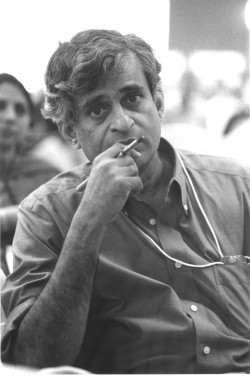
PALAGUMMI SAINATH, the rural affairs editor of The Hindu, who was recently named as a recipient of the 2007 Ramon Magsaysay Award, spoke to Sunil Sethi, the books editor of NDTV, over the weekend:
***
What has changed in the last 10 years: "We are in the middle of the greatest agrarian crisis since the eve of the Green Revolution. We are seeing a collapse of agriculture; hundreds of thousands of people are leaving villages for cities in search of jobs which are not there; we are seeing a collapse and tanking of prices of cash crops which people were persuaded into growing; and we are seeing some of the largest numbers of suicides (112,000 in the last ten years) in our history."
How has political leadership changed: "The ruled are no longer willing to be ruled in the old way, the rulers are unable to rule in the old way. People are far more conscious of their rights, and assert them more positively. The devolution of governance is a major advance as is the upsurge of the oppressed classes and castes. However, while there is a devolution of power at the village level, you have a huge centralisation at the global level. You have a WTO (World Trade Organisation) which makes sweeping decisions that crack at your agriculture. Your village sarpanch cannot handle that."
The gaps are gigantic, and they are growing: "Who you are, where you are, and what you do matters a great deal in India today. If you belong to the top 10-15 per cent of rural India, or the top 15-20 per cent in urban India, you are expericiencing a lifestyle you never dreamed of. If you belong to the bottom 40 per cent of either urban or rural India, you are experiencing a deprivation you never imagined. The gaps are just gigantic and they are growing. When the national rural employment guarantee scheme (NREGA) was launched, in Andhra Pradesh, in less than 7 days, 2.7 million people had queued up and given applications, included landed farmers."
The rich are getting richer, poor poorer: "If you look at Forbes , the oracle of capitalism, India ranks 4th in the number of dollar-billionaires, after America, Germany and Russia. More recently, some gentleman paid Rs 15 lakh to pick a preferred number for his cellphone. Yet, we rank 126th in human development, behind Botswana. The average farm household's monthly per capita expenditure is Rs 503 out of which 60 per cent is spent on food, and 18 per cent on fuel, clothing and footwear."
Our definition of poverty is a farce: "Our definition of povery excludes education, health and santitation… Hunger keeps rising, food per capita available keeps falling, unemployment keeps rising, migration keep rising, but poverty keeps falling. It is as if poverty has a separate existence, independent of food intake, lifestyle, employment and education."
We are eating less under liberalisation: "In 1991, the foodgrain available per Indian was 531 grams per day. In 2005, it had fallen to 437 grams. Meaning, the average Indian is consuming 100 grams less per day than he did 10 years ago at the cusp of liberaliation. On the other hand, you and I are eating better now than we ever did. It raises the qeustion, what the heck are the bottom 40 per cent eating?"
The basic inequality of our society remains: "The four or five basic issues of Indian society have never been resolved. Today, we can get an SEZ (special economic zone) cleared in six months; we have not managed land reforms in 60 years, except in three States. We not have resolved tenancy reforms, regional issues, or caste. Basically, the unequal nature of our society has changed only for the worse. It's like building a penthouse on the 50th floor without a foundation."
Healthcare has gone for a toss: "Of the monthly per capita income of a farm household, which is Rs 503, Rs 34 is spent on health and Rs 17 on education. Over 200 million do not seek medical attention because they simply cannot afford it. This is the same country that boasts of medical tourism, and hands out of billions of rupees to corporate hospitals on the promise of reserving 30 per cent of their beds for poor people which they never do."
Not two nations, two planets: "The urban poor are rural poor who have migrated. We are pushing people to cities but not designing cities to accommodate them. Those who come from the villages are neither farmers nor workers. They are the in-betweens, domestic servants and the like. It is no longer a two-nation divide, it's two planets. Vastly different lifestyles, vastly different living standards, and vastly different levels of stress and distress."
Photograph by Sadanand Menon
Also read: Will private agriculture colleges kill our farmers?

1 comment:
India makes billionaires like Ambanis, Premji and Mittal etc. India also makes many peasants to starve. Suicides of farmers in Vidarbha and Telangana etc are worse examples of evil effects of neo-liberal globalisation.
Post a Comment